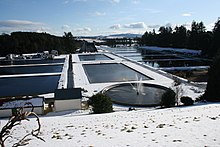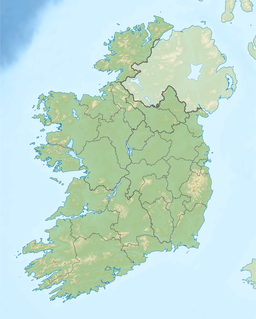Vartry Reservoir
This article has an unclear citation style. The reason given is: citation name "sign" is an image between two refs, but does not supply valid citation details. (July 2020) |
| Vartry Reservoir Taiscumar Fheartraí | |
|---|---|
 Roundwood Lakes | |
| Location | County Wicklow |
| Coordinates | 53°03′31″N 6°12′12″W / 53.05861°N 6.20333°W |
| Type | reservoir |
| Primary inflows | River Vartry |
| Primary outflows | River Vartry |
| Basin countries | Ireland |
Vartry Reservoir (Template:Lang-ga) is a reservoir at Roundwood in County Wicklow, Ireland. The water is piped from Vartry to a large open service reservoir in Stillorgan in the southern suburbs of Dublin. The reservoir is operated by Irish Water.[1]
The original (lower) reservoir was completed in 1863 and has a capacity of 11.3 billion litres and a maximum depth of 18.3 metres. A second embankment, 3.5 km upstream, was completed in 1923 to form the upper reservoir. This has a capacity of 5.6 billion litres and a maximum depth of 13.4 metres.[1]
History


The Vartry Reservoir scheme involved the partial redirection and damming of the Vartry River, the building of a series of water piping and filtering systems (and related public works) to carry freshwater to the city.[2]
Between 1862 and 1868 the lower reservoir was formed by constructing an earthen dam across the valley of the River Vartry after a Dublin Water Works Committee was established to develop a new water supply to Dublin and suburbs.[3] The committee was chaired by Dr. John Gray who actively promoted what would become the "Vartry scheme".[4] The scheme was formally opened on June 30, 1863.
This work was particularly important in the improvement of living conditions and public health in Dublin city.[4] It improved sanitation and helped reduce outbreaks of cholera, typhus and other diseases associated with contaminated water.
The lower reservoir and its capacity is mentioned in chapter 17 of James Joyce's Ulysses.[5]
References
- ^ a b Image of Dublin City Council sign at the reservoir
- ^ ENFO - Ireland's public service department with responsibility for environmental publications - Article on Dublin's Water Supply
- ^ Norwood, John (1973) [1872]. On the Working of the Sanitary Laws in Dublin, with Suggestions for their Amendment. Vol. VI, Part XLIII. Dublin: Journal of the Statistical and Social Inquiry Society of Ireland. pp. 230–242. [1] [2]
- ^ a b "Glasnevin-Cemetery.ie - Entry on Sir John Gray". Archived from the original on 18 November 2007. Retrieved 1 August 2008.
- ^ Joyce, James (1922). Ulysses. Shakespeare and Company. pp. 623–624.

